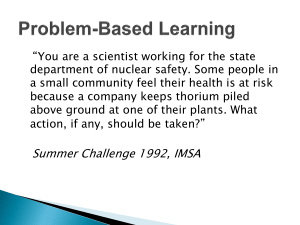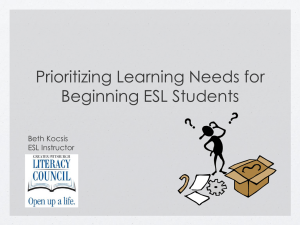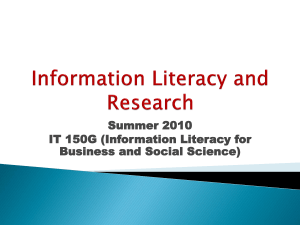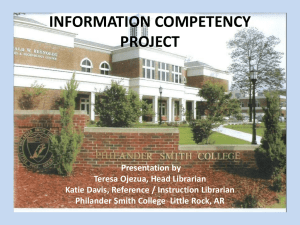Presentation
advertisement
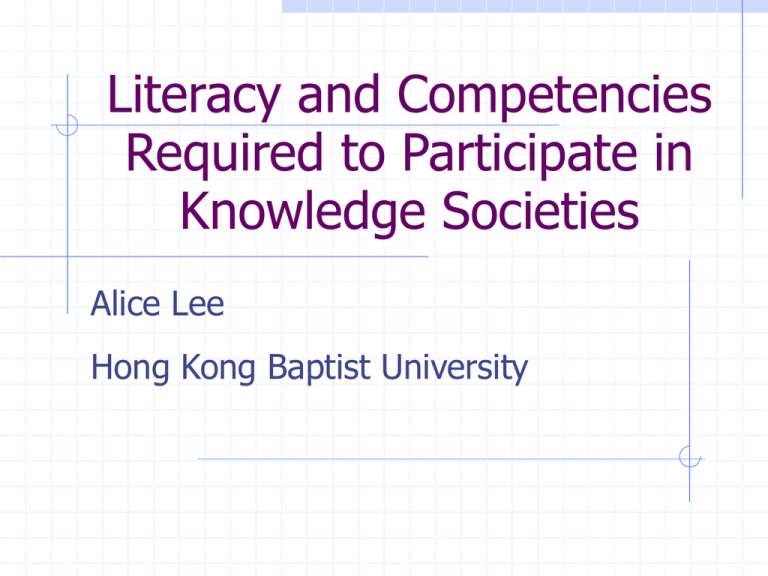
Literacy and Competencies Required to Participate in Knowledge Societies Alice Lee Hong Kong Baptist University Objectives of the Study (1) Examine the new socio-technological environment and analyze the need for new literacy education; (2) Study the literacy concepts developed in recent years, map out future skills and put forward a framework of 21st century competencies; (3) Analyze the challenges of implementing the WSIS Action Lines C3 (Access to Knowledge) and C9 (Media), and related them to the cultivation of the 21st century competencies in both developed and developing countries; (4) Develop recommendations regarding the promotion of information for all and the cultivation of competencies that facilitate all people to have fruitful participation in the knowledge societies. Methodology: Historical Sociology A research approach that integrates sociology and historical concepts and methods Preoccupied with epochal interpretation Sensitive to social inequality Humanistic Data collection Document analysis Journal articles, books, reports, achieve documents… Interview Content analysis Answer “why” and “how” questions The Changing World Studying the Future Alvin Toffler: The Third Wave Manuel Castells: The Rise of Network Society Lars Tvede: Supertrends Apollo Research Institute: Six drivers of change in the coming decade Three Major World Trends Revolutionary Development of ICTs Transition to knowledge societies New learning mode of the Net Generation Mass Media Printing Television Broadcasting Photo reproduction VCR Radio broadcasting Cable technology Filming Satellite Telecommunication Web 1.0 Websites Online media Video on demand Digital broadcasting IPTV Web 2.0 We Media: Citizen journalism sites Blogs Wikis Social networks (e.g. Facebook, MySpace, Bebo, Google+) Media sharing sites (e.g. Podcasting, photo-sharing sites such as Flickr, video sharing services such asYouTube) Social bookmarking sites (e.g.Delicious) Microblogging services (e.g. Twitter, Weibo) Web 3.0 and Beyond Semantic Web The Internet of things Cloud computing Artificial intelligence applications Mobile technologies: Smartphones and apps (location-based services with GPS) Social network sites as platforms HTML5 Big data Robotics Virtual avitars New gadgets: Inexpensive and small size tablets & smart phones, wearable computing devices, iTV, smart vehicles, memory machines, e-reading devices The Challenges of the New Technologies Master the ICT skills Handle the influences of the new technologies Deconstruct the huge amount of information coming from different sources Learn how to use the communication power Online security (e.g. online shopping, cyber bullying, invasion of privacy, copyright) Respond to the social inequalities generated by the development of ICTs The Transition to Knowledge Society The reception, production and transmission of information/knowledge are essential in social, economic, political and cultural sectors cultivate a media and information literate population becomes essential for the development of a society Media and information are vital for engaging people in the democratic process, building communities and strengthening civil society Manual Workers vs. Knowledge Workers Manual Workers Knowledge Workers Need efficiency Need effectiveness The ability to do things right The ability to get right things done Be judged in terms of the quantity and quality of a definable and discrete output Knowledge work is defined by its results They were told to do things They must direct themselves toward performance and contribution Future knowledge workers should have the ability to not only acquire information, but also transform it into knowledge that empowers them to improve their livelihoods and contribute to the social and economic development of their society The Net Generation Future Competencies in Knowledge Societies The Changing Concept of Literacy Traditional Literacy Media Literacy/ Information Literacy Computer Literacy/ ICT Literacy Multi-media Literacies/ Media and Information Literacy (MIL) Technological Epoch Printing age Electronic age Computer age Internet age Dominant Medium Print (e.g. book, newspaper, magazine) Audio-visual media (e.g. radio, film, TV) Computer (Internet Web 1.0) Multi-media and mobile device (Internet Web 2.0) Medium Format Text Sound and moving image Data and Digital information Digital information (integrating word, sound, image, data and graphic) Delivery Pattern Linear (one-way) Mosaic (one-way) Component (two-way) Network (participatory, realtime and interactive) Literacy Training Native tongue language course (reading and writing) Media literacy training , information literacy training Computer studies Media and information literacy education (multiliteracies training) Timeline Before 1960s Starting from 1960s and 1970s Starting from 1980s 21st Century Flourishing Literacy Frameworks Stand-alone literacy concepts computer literacy, ICT literacy, Internet literacy, digital literacy, electronic literacy, new media literacy, information fluency, mobile literacy … Compound literacy concepts Multiliteracies, transliteracies, new literacies, metaliteracies, digital media literacy, media and information literacy (MIL) Integrated framework of 21st century competencies Framework of 21st Century Competencies 21st Century Competencies Conceptual Competencies -Connectivist Skill -Innovative Thinking and Problem Solving Skill -Critical Thinking Skill -Reflective Thinking Skill -Positive Thinking Skill Practical Competencies -Media and Information Literacy -Learning Skills (collaborative learning, selfdriven learning & lifelong learning) Human Competencies -Social Networking and Virtual Collaboration -Self Management -Humanistic Consciousness -Digital Citizenship -Cross-cultural Interaction Skill Conceptual competencies: Ways of thinking Practical competencies: Ways of handling information in work and life Human competencies: Ways of interacting with people Management theories Managers and executives should have three types of skills: conceptual, technical and human skills Peter Drucker: Every knowledge worker is an executive Conceptual Competencies Practical Competencies Human Competencies Future MIL Components Knowledge, Skills and Attitude Access/Retrieval of Media and Information -‘Button knowledge’: the technical skills needed to use digital technologies -Information search skills -Curation intelligence -Transmedia navigation skills Access Evaluation/Understanding of Media and Information Understanding -Understanding media and informational content, format, institutions and audience -Computational thinking: ability to translate vast amounts of data into abstract concepts and understand data-based reasoning Assessment and Evaluation -Cognitive load management: ability to discriminate and filter information for importance -Sense-making: ability to determine the deeper meaning or significance of what is being expressed -Critical digital literacy: ability to critically assess the quality and validity of content that uses new media forms, and to leverage these media for persuasive communication -Photo-visual skills: ability to read instructions from graphical displays -Real-time processing skills: ability to process and evaluate large volume of information in real time Organisation and Synthesis -Knowledge management -Skill of abandonment Use/Create/Communicate Media and Information Communication and Use -Effective communication and information sharing -Story-telling skills -Specific medium use -Interactive tool use -Security practice -Application and goal achievement -Ethical use of media and information Creation and Problem Solving -Creativity -Design mindset: ability to represent and develop tasks and work processes for desired outcomes -Media and information production techniques -Collective knowledge construction and collaborative problem solving Monitoring -Media and information criticism and monitoring Challenges of Implementing Action Lines C3 and C9 Implementation of Action Line C3 Access to Information and Knowledge Access to ICTs Digital divide The right to information 1. Physical access to information has improved as ICTs develop The world was home to 7 billion people, one third of which were using the Internet. Totally 2.3 billion people were online. 45% of the world’s Internet users were below the age of 25. With 5.9 billion mobile-cellular subscriptions. Growth was driven by developing countries. Mobile use in developing countries has created a “leapfrog” phenomenon 2. From digital divide to digital use divide 3. The right to information IFAP Upgrading ICT infrastructures MIL Project Digital library programs Open data movement: OER, FOSS, multilingualism 21st century competencies Implementation of Action Lines C9 Media Freedom of speech Press freedom Media pluralism 1. Freedom of speech and press freedom have been under severe constraint in many countries 2. Increasing media concentration (affects media pluralism) 3. The balance power of the “we media” 21st century competencies Barriers and challenges of implementing the WSIS Action Lines Lack of access (SES, age, gender, disability, race, language and political instability) Digitial use divide Limitation to freedom of speech/press freedom Increasing concentration of media ownership Enablers and opportunities Multiple stakeholders’ contribution International and domestic donors’ funding support Mobile technologies and leapfrog effect Citizen journalism Education reform Adult education opportunities (lifelong learning) Self-efficacy of Net Generation Open educational resources (OER) movement Groundswell movement (global volunteer network) Recommendations Recommendations 1. Maximizing mobile technologies and promote m-learning 2. Cultivating 21st Century Competencies Curriculum Framework of 21st Century Competencies Goals 1.Equip citizens in all societies with necessary literacy and competencies to fully participate in future knowledge societies 2.Narrow the digital use divide 3.Foster media pluralism and promote right to information Curriculum Content 21st century competencies (conceptual, practical and human competencies) Pedagogy Collaborative and participatory learning Venue Inside and outside classrooms located both inside and outside schools Target School children, college students and adults Curriculum Delivery Approach 1.Knowledge pull, not information push 2.Individual modules on 12 competencies Promotion Strategies: Partnership Model 1.Establish partnerships amongst international institutions, governments, NGOs, business sectors, schools and parental organisations 2.Provide affordable mobile tools for information access 3.Set up international clearinghouse for 21st century competencies 4.Form OER platform 5.Build up local implementation network 6.Develop local curriculum content 7.Design digital courses (online and mobile versions) 8.Explore innovative teaching practices 9.Provide training for school teachers, youth workers and community educators 3. Establishing collaborative networks and strategic partnership - Partnership Model of Promoting 21st Century Competencies 4. Education reform and teacher training 5. Contextualizing initiatives in specific cultural settings Considering the power of individuals, particularly the members of the Net Generation Training for producing high quality user-generated content Groundswell movement and social network support Self-efficacy of Net Generation Research on Net Generation The Long Revolution Raymond Williams Democratic revolution Industrial revolution Cultural revolution Education and literacy training “We must certainly see the aspiration to extend the active process of learning, with the skills of literacy and other advanced communication, to all people rather than to limited people, as comparable in importance to the growth of democracy and the rise of scientific industry.” Full Participation in Knowledge Societies WSIS: “To build a people-centered, inclusive and development-oriented Information Society, where everyone can create, access, utilize and share information and knowledge” Thank You! alicelee@hkbu.edu.hk

